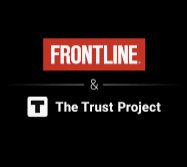Can the Trust Project succeed in the age of Q?
“"One of the problems we have is the 'trust me because I’m a journalist' approach,” says Sally Lehrman, founder of the Trust Project.
An international leader in the battle against fake news, Lehrman is attempting to fight fire with media literacy by starting at home.
“Yes, ...we have these rock-solid values and ethics but we have to communicate that and to be accountable for that.”
The Trust Project has identified 8 things any news media can do - such as labeling news versus opinion and showing sources - to earn approval as an accredited newsroom.
Companies who agree to the code can apply to the Trust Project, and after approval, post a “T” next to their articles to show the newly earned status.

So far The Trust Project has partnered with 50 of the top news sites in the world, BBC, CBS and Hearst.
“Trust does not invite cable news in just yet. Cable news is filtering itself out. [It} is perceived by the public as being very partison..the reason {is that the} cable channels are dominated by opinion and talk shows.”
FoxNews, she said, did not apply.
Also not invited are one-man blogs. “We only consider newsrooms with employees.”
Local media, on the other hand, are encouraged to participate. Their deep relationship with readers and higher trust levels give them a critical role in educating consumers on media literacy.
Joining the Project is free. The approval process itself consists of filling out a lengthy questionnaire and waiting for the review process that currently takes about 6 to 8 weeks, a time frame Lehrman hopes to shorten.
Technical implementation typically only takes a few days. There is a Word Press plug-in and developers to help with the common CMS systems.
Most of the implementation time is spent on thinking through policies.
“Smaller companies are more nimble and can go faster...The larger (media groups) need approvals all the way up, and to train more staff.”
“Adoption has been a combination of wooing, coaxing and ultimately requiring news organizations to raise their transparency standards,” Lehrman said.
The Trust Project, however, is entirely voluntary and not intended to police the industry. Lehrman divides the ecosphere of trust initiatives into two basic trends: The Police and the Elevators.
“One trend is to push down misinformation and the other is to uplift integrity, promoting journalism that is reputable, reliable, and accurate,” she says.
Fact-checkers play the important role of “pushing down misinformation.
The Trust Project, on the other hand, elevates the legitimate news media as a brand
She considers watermarking - which uses Blockchain protocol to trace any distortions of content like micro-chipping - another method of elevating legitimacy.
“If you have an animal and put a chip in it, you can find them. It makes it harder for bad actors.”
Facebook and Bing also work with the Trust Project, although how the designation is used to surface stories remains murky at best.
“I can send you a press release that summarises what they say publicly about how they use the trust indicators.”
The press release says only “Trust indicators can be helpful” for Google's internal evaluation of search result quality. Facebooks” context button uses them as a component. And Bing uses labeling to sort news from opinion.
While it's hard to see The Trust Project gaining real traction among the public with these critical players declining to publicly alter their algorithms. However, the non-profit already claims to reach half a billion people worldwide anyway.
If anything local media should not only embrace this movement but also go one further and publish their own code of journalism in the navigation bar. It is a small but important step towards countering the forces of disinformation preying on American democracy.





